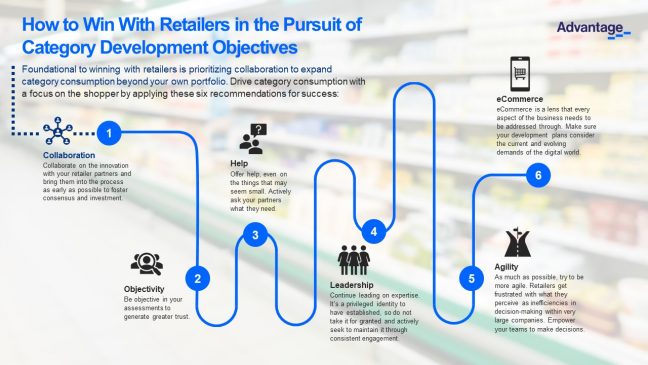Sponsored content

As category management becomes an increasingly crucial element of the shopper experience, suppliers and retailers must treat category development objectives with the extreme importance they deserve. Managing category development, therefore, requires collaboration between retailers and suppliers to pursue mutual interests.
What has caused the urgency around category development with retailers?
The increased global urgency around category development is due to the uptick in negative financial implications of innovations and Stock Keeping Units (SKU) that do not actively drive consumption at the point of sale. Retailers have always wanted suppliers to innovate and drive consumption. However, the need is more pressing as shelves are stocked with products that financially drain retailers and compromise the shopper’s experience.
As retailers actively voice their need for innovation, suppliers must listen, respond and not be complacent. Retailers have expectations of objectivity and a genuine interest in expanding category consumption beyond the supplier’s key portfolio. They want partnerships that are focused on driving category development and consumption.
The path to purchase has not changed with brick and click
Consumers are, for now, still very much tied to ingrained training by suppliers and retailers in terms of the path to purchase, even in digital environments. While the physical or digital course may look different, the time in the shop to purchase specific items remains the same. Consumers still respond best to impulse purchases at the end of the aisle, essentials or basket drivers during the leading shop. To help drive the expansion of assets across the category, be considerate of innovation targeted across the duration of the shop.
Key recommendations for excelling in category development with retailers
Foundational to winning with retailers is prioritizing collaboration to expand category consumption beyond your own portfolio. Drive category consumption with a focus on the consumer by applying these six recommendations for success with your retailer partners.
Collaboration – Collaborate on the innovation with your retailer partners and bring them into the process as early as possible to foster consensus and investment. Connecting with your partners helps both codevelop strategies, align on messages and effectively meet the needs and wants of shoppers.
Objectivity – Being objective in your assessments removes your bias and emotions and generates trust with your partner. It sends a message that you are interested in cultivating a healthy and successful partnership. Use fact-based data and present strategies that drive consumption, benefitting both supplier and retailer.
Help – Offer help, even on issues that appear insignificant. Actively ask your partners what they need. This will show a genuine interest and attempt at mutual, not independent, growth.
Leadership – Continue leading on expertise. It’s a privileged identity to have established, so do not take it for granted and actively seek to maintain it through consistent engagement. Lead with your knowledge of the local market and your products. This will show retailers that a thorough understanding informs your leadership of what the local market wants and that your category development solutions reflect that.
E-Commerce – Every aspect of the business needs to be assessed through the lens of e-commerce. Make sure your development plans consider e-commerce platforms, integrated systems, and current and evolving trends in the digital world. Be mindful that this also includes and may depend on the digital needs of consumers who are steadily becoming more reliant on technology to satisfy their shopping needs.
Agility – As much as possible, try to be more agile. Retailers are frustrated with what they perceive as inefficient decision-making within large companies. Empower your teams to make decisions that they are confident in by aligning on strategies and keeping communication lines open.

Though category development requires the right expertise and resources, a successful relationship with your retailer partner is key to building sustainable success. Many of these recommendations are based on actively listening to and understanding your retailer partner’s needs. Advantage Report helps you deepen your collaboration, connect with retailers, and find new and improved ways of working together, ultimately leading to tremendous commercial success.
To learn more about building your partnership with retailers, get in touch with an Advantage Engagement Advisor.

